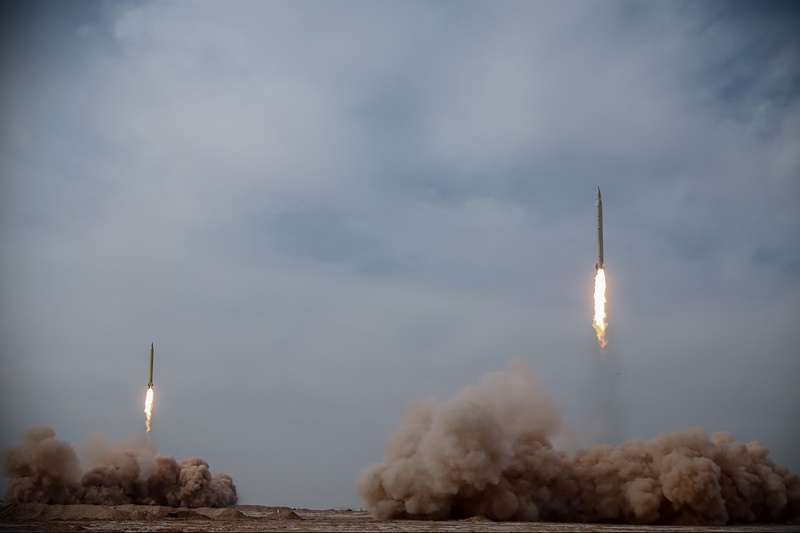 This handout photo shows a launch of missiles during a military drill in an unknown location in central Iran yesterday. - AFP
This handout photo shows a launch of missiles during a military drill in an unknown location in central Iran yesterday. - AFPTEHRAN: Iran's Revolutionary Guards test-fired ballistic missiles against targets in the Indian Ocean as they wrapped up a two-day exercise, their official website reported yesterday. The missiles of "various classes" targeted "the enemy's battleships and destroyed them from 1,800 km away," according to the Sepahnews website. The missiles were fired from central Iran at targets located in the northern Indian Ocean, the Guards said. A video released by state television showed two missiles being launched and targets being hit at sea.
Iran's armed forces chief of staff Major General Mohammad Bagheri was present on the second day of the drill, alongside Guards chief Major General Hossein Salami and aerospace commander Brigadier General Amirali Hajizadeh. "One of our major goals in defense policies and strategies is to be able to target enemy ships, including aircraft carriers and battleships, using long-range ballistic missiles," Salami said, quoted by Sepahnews.
Bagheri said the launch showed Iran was ready to respond to any "ill will" by its enemies, warning that in such cases "they will be targeted and destroyed by our missiles". "We do not intend to carry out any attack," he said, adding the exercise showed Iran's readiness to defend itself "with all its strength" against any aggressor.
Dubbed Great Prophet 15, the exercise also featured a drone attack on a missile defense system followed by the launch of a barrage of "new generation" surface-to-surface ballistic missiles. The war games come at a time of rising tensions with the United States in the final days of President Donald Trump's administration.
It was Iran's third military exercise in less than two weeks after a naval exercise in the Gulf of Oman on Wednesday and Thursday, and an army drone drill on Jan 5-6. The exercises started two days after Iran marked the anniversary of the assassination of revered Guards commander Qasem Soleimani, killed in a US drone strike in Iraq in January last year.
Meanwhile, the US Defense Department announced Friday that it would include close ally Israel in the area covered by its Middle East-focused Central Command. In another sign of the rapprochement brokered by President Donald Trump between Israel and Arab countries, the Pentagon said US military dealings with Israel would no longer be handled by its European Command.
"We structure boundaries to best mitigate risk and protect US interests and partners," the Pentagon said in a statement. "The easing of tensions between Israel and its Arab neighbors subsequent to the Abraham Accords has provided a strategic opportunity for the United States to align key partners against shared threats in the Middle East."
That was mainly a reference to Iran, which the United States, Israel and Arab countries including leading power Saudi Arabia view as the leading security threat to the region. For decades at odds with its Arab neighbors over its treatment of Palestinians, Israel has over the past year broken barriers on open cooperation and communications with Gulf countries under the Trump-fostered Abraham Accords.
Moving it under the Central Command potentially makes security cooperation with the United States on regional matters easier, and could bring Israeli military officials in closer proximity to those of Gulf neighbors. But it could also complicate CentCom cooperation with Iran allies like Iraq, where the US retains 2,500 troops. "Israel is a leading strategic partner for the United States, and this will open up additional opportunities for cooperation with our US Central Command partners, while maintaining strong cooperation between Israel and our European allies," the Pentagon said. - AFP









